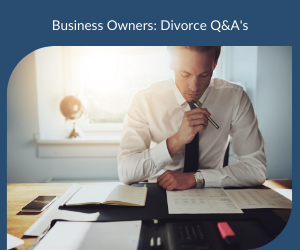
If you own a business and you are heading into a divorce, you are most likely wondering how you and your business will be affected by the divorce. Outcomes of divorces that include joint business ownership vary based on several components. Considerations and results will be unique to the situation. This is not a one size fits all answer since each couple, just like each business, is unique.
When you and your spouse have jointly owned a business and you are now considering a divorce, the questions and concerns tend to be two-fold. Not only do we have to consider the family matters of the divorce, we also must consider the business matters. It is common to have many questions, so we have compiled a few of the most common questions below along with answers to provide guidance during this uncertain time. In addition to these Q&As, we highly advise those going through a divorce who are business owners to consult with an experienced divorce lawyer who specializes in businesses and high net worth divorces. If you have questions that are not answered here, please let us know:
How will my business be distributed as a result of divorce?
Pennsylvania is an equitable distribution state which means there is no 50/50 presumption. Equitable distribution is a three-step process, requiring the identification of the components of the marital estate, the valuation of these assets, and finally, the application of the multiple factors set forth in the Divorce Code to determine the actual distribution between the parties. These “factors” may result in an uneven distribution, or, in appropriate cases, an award of the bulk, or all, of the marital estate to one party.
How is the business valuation done?
The most common valuation performed is fair market value, which is based upon the price that a business could sell for on the open market. This means the price a willing buyer would pay a willing seller when neither is under any pressure to buy or sell. Relevant factors include: 1) the nature and history of the business; 2) the economy and economic outlook; 3) book value; 4) earnings; 5) dividends; 6) intangible value such as goodwill; 7) actual sales of similar companies; and 8) the stock value of similar publicly traded companies.
Should I get my own business valuator?
It is sometimes beneficial for both spouses to agree on a single valuation firm or individual to complete the process because the process of valuing a business is time-consuming and expensive. However, there are cases where the legal issues involved might require the retention of an expert solely to advocate your position.
A business valuation is not an easy, straightforward process because each business valuator has their own approach and each business is unique. One thing is certain, though, and that is ensuring the right professionals are hired to handle the business valuation. This may sound like a difficult task, but an experienced attorney can help to find the business experts that are right for the case.
What are my options to keep or sell the business?
There are many topics that need to be discussed when it comes to distributing the assets from a family business; however, there is one main decision that needs to be made – what happens to the business after the divorce? Here are a few scenarios:
Sell the Business – If you and your divorcing spouse do not want to own the business any longer, you can get it appraised and put it up for sale to ultimately split the proceeds.
Split the Business – In this case, one portion would be run by one spouse and the other portion would be run by the other. If the business units cannot be run separately, or cannot be split evenly, this may not be an option for you. Furthermore, continuing in a business with a former spouse may not be a viable option for a multitude of reasons.
Buy Your Divorcing Spouse’s Portion – A popular option for couples going through a divorce is to buy out the business from their ex. If you do not have the funds readily available, you could look into a structured agreement for payment and/or offer the amount by the means of other assets.
Continue Joint Ownership – Another option is to continue to own the business together. In this situation, both spouses would need to have a productive working relationship after the divorce is final.
RELATED: Learn how you can protect your business from your spouse during a divorce.
Every couple is different and has their own, unique circumstances. Because of this, each divorce settlement is not the same as any other. We advise those individuals going through a divorce to lean on experienced legal experts to help them through the many steps and issues that may arise to ensure that what is decided is best for all involved – especially if a family business is a factor.
Over the years, Wilder Mahood McKinley & Oglesby has successfully represented hundreds of clients, ranging from small-business owners to shareholders in multimillion-dollar corporations. If you are a business owner and are seriously considering divorce, our Pittsburgh family business attorneys can help you obtain an accurate business valuation as well as assertively defend your interests in that business in the face of a divorce proceeding.
If you have additional questions from what is included above, or if you would like more information about how our law firm can help you, contact us online or call us at 412-261-4040.
FAMILY LAW SERVICES
Divorce
Legal Separation
Prenuptial & Postnuptial Agreements
Tax Issues
Fees
Adoption
Same-Gender Marriage
Domestic Partnerships
Child Custody
Family Support
Mediation in Divorce Matters










